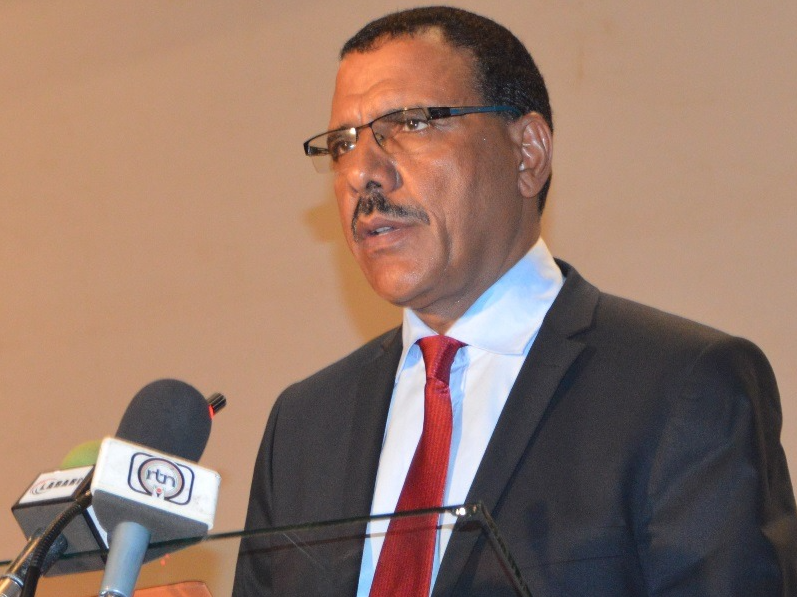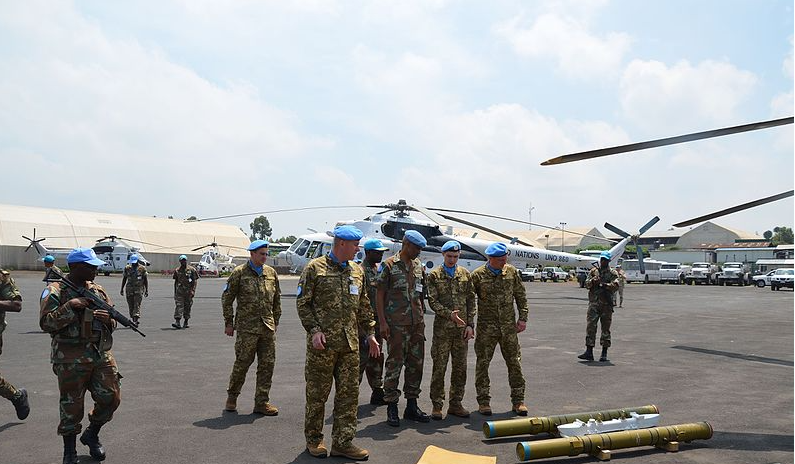“Niger junta leader General Abdourahamane Tchiani announced that his country will allow the military governments of Mali and Burkina Faso to send their soldiers into Niger to defend against an attack.”
A new pro-Russia geopolitical bloc is gaining steam in West Africa. Composed of francophone military regimes in Mali, Burkina Faso, and Niger, the new bloc is showing itself to be a cohesive and problematic new alliance in regional military, security, and political affairs with assistance from Russia and the Wagner Group. The first excerpted article, from the French state-sponsored RFI reposted on the pan-African news aggregator AllAfrica.com,includes the first known reference to a so-called “Mali-Russia-Niger Axis.”. To that “Axis,” one should also add Burkina Faso, a close ally of Mali, the Nigerien junta, and Russia. Mali and Russia formed the basis of this “Axis” after its two coups in 2020 and 2021, and Burkina Faso’s own 2022 coup led it to quickly fall in with the other two states.[i] Niger’s own military-led overthrow led its new government to the newest member of the “Axis.” The four countries increasingly support one another. According to the RFI article, Russia recently vetoed a UN Security Council resolution that would have kept UN observers in Mali. This veto was both a boon for Mali, which had demanded the end of the UN’s peacekeeping mission, and for Russia, which the UN had, in veiled language, accused of widespread human rights abuses in Mali. The second article from AllAfrica.com states that the Nigerien junta recently signed a pact with Mali and Burkina Faso to allow their troops to enter Niger to defend it against an external attack. This pact was made in reference to discussions of a potential Economic Community of West African States (ECOWAS) military intervention into Niger to oust that country’s leader, General Abdourahamane Tchiani.[ii] Regarding Russian involvement, Mali, Burkina Faso, and Niger all have varying degrees of engagement with the Wagner Group.[iii] Moreover, in all three countries, Russian misinformation and disinformation campaigns, particularly decrying French presence, have been rampant. In return, Mali has been a supporter of Russia’s invasion of Ukraine. Increasingly, West Africa is being split into two camps. On one side is the described pro-Russia axis, while on the other side are the France-friendly countries like Senegal,[iv] Cote d’Ivoire, Benin, Togo, and Nigeria, the latter of which chairs ECOWAS.
Sources:
Melissa Chemam, “West Africa: Niger’s Junta Finds Support in Mali and Russia, But France Stands Firm,” AllAfrica.com (pan-African news aggregator), 11 September 2023. https://allafrica.com/stories/202309120079.html
The leaders of Russia and Mali have agreed the political crisis in Niger should be resolved using diplomacy and not force. Meanwhile, France has rejected accusations by Niger’s coup leaders that it’s planning a military intervention.
The Kremlin said President Vladimir Putin and interim Malian leader Assimi Goita had talked by telephone at Bamako’s request.
The comment came a day after Niger’s military rulers accused former colonial power France of assembling troops, war materials and equipment in several neighboring West African countries with a view to “military intervention” in the Sahel state.
A Mali-Russia-Niger axis
During his telephone exchange with Putin, Goita thanked Russia for vetoing an attempt by the UN Security Council to keep a team of UN experts in Mali.
The experts had accused “foreign forces”, a veiled reference to the Russian mercenary group Wagner, of involvement in widespread abuses in Mali.
Mali shares a long border with Niger, and, immediately after the coup, its junta voiced support for Niger’s new military rulers.
It has on several occasions stated its opposition to a military intervention there.
Mali has shifted sharply to Russia since back-to-back coups in 2020 and 2021, becoming one of the few nations to back Moscow at the United Nations over its invasion of Ukraine.
The Kremlin added that Putin and Goita also discussed cooperation between Russia and Mail on economic and commercial issues, and on “anti-terror” operations.
Ecowas leaders have threatened to intervene militarily in Niger, the fourth West African nation since 2020 to suffer a coup after Mali, Burkina Faso and Guinea.
“Niger: Junta Leader Signs Order to Allow Help from Burkina Faso, Mali Military,” AllAfrica.com (pan-African news aggregator), 25 August 2023. https://allafrica.com/stories/202308250228.html
Niger junta leader General Abdourahamane Tchiani announced that his country will allow the military governments of Mali and Burkina Faso to send their soldiers into Niger to defend against an attack.
Tchiani had been in a meeting with the foreign ministers of Burkina Faso, Olivia Rouamba, and Mali, Abdoulaye Diop, visited Gen Tchiani in Niamey before signing the order.West African regional bloc Ecowas was threatening to use force if President Mohamed Bassoum is not reinstated, but the regional West African bloc is focusing on diplomacy for now.
Notes:
[i] For more reading on the relationships between these four countries, see: Jason Warner, “Burkina Faso Claims Disguised Jihadists, Not Military, Responsible for Civilian Killings,” OE Watch 06-2023.https://fmso.tradoc.army.mil/2023/burkina-faso-claims-disguised-jihadists-not-military-responsible-for-civilian-killings/; Jason Warner, “Vast Majority of Malians Express Confidence in Russia’s Ability To Address Jihadist Violence,” OE Watch, 06-2023. https://fmso.tradoc.army.mil/2023/vast-majority-of-malians-express-confidence-in-russias-ability-to-address-jihadist-violence/; Jason Warner, “Russia-Supported Military Rulers in Mali, Burkina Faso, and Guinea Continue To Deepen Ties,” OE Watch, 04-2023. https://fmso.tradoc.army.mil/2023/russia-supported-military-rulers-in-mali-burkina-faso-and-guinea-continue-to-deepen-ties/; Jason Warner, “Mali Defends Reliance on Russian Counterterrorism Assistance,” OE Watch, 03-2023. https://community.apan.org/wg/tradoc-g2/fmso/m/oe-watch-articles-2-singular-format/437332; Jason Warner, “West African States Ruled by Military Leaders Seek To Circumvent Future Sanctions” OE Watch, 03-2023. https://fmso.tradoc.army.mil/2023/west-african-states-ruled-by-military-leaders-seek-to-circumvent-future-sanctions/
[ii] For more on the perspectives of the potential ECOWAS intervention, see: Jason Warner, “West African States Split on Potential ECOWAS Intervention in Niger,” OE Watch 08-2023. https://fmso.tradoc.army.mil/2023/west-african-states-split-on-potential-intervention-in-niger/
[iii] Mali has a substantial Wagner presence in the country. In Burkina Faso, the government has denied the official presence of Wagner, though many observers, including Ghana’s president, have claimed that the private military company does indeed operate there. In the case of Niger, reports have emerged that the Tichani has requested Wagner’s presence, though it is yet unconfirmed if this call has been answered. For more on Burkina Faso’s relationship with Wagner and Russia, see: Jason Warner, “Burkina Faso Fights Terrorism With Recruits and Russia,” OE Watch, 02-2023. https://fmso.tradoc.army.mil/2023/burkina-faso-fights-terrorism-with-recruits-and-russia/
[iv] Even within Senegal, members of the political commentariat have decried Senegal’s potential participation in a theoretical ECOWAS intervention into Niger. For instance, an op-ed signed by more than one hundred Senegalese in the news outlet Sud Quotidien called participation in such an intervention “a neocolonial military adventure.” See: “Afrique de l’Ouest: L’aventure militarie neocoloniale du President Macky Sall (West Africa: The neocolonial military adventure of President Macky Sall),” Sud Quotidien (Senegal-based news outlet), 6 September 2023. https://fr.allafrica.com/stories/202309070398.html


